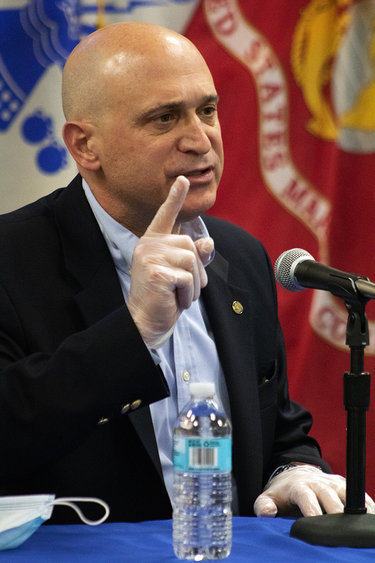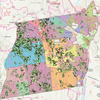As sales-tax revenues plummet, counties seek federal aid
ALBANY COUNTY — Albany County Executive Daniel McCoy said that he and his counterparts across the state and nation spent Easter Sunday fighting to get federal stimulus money for counties.
The city of Albany had been slated to get $254 million and the county to get nothing, McCoy said at his Friday press briefing.
McCoy, who is president of both the New York State County Executives Association of the New York State Association of Counties and the County Executives of America, said counties are in the front lines of fighting the coronavirus pandemic and need to be prioritized in the next federal stimulus package.
Stephen Acquario, executive director of NYSAC, spoke at the briefing about plummeting sales-tax revenues in the wake of the economic shutdown meant to reduce the spread of the coronavirus.
He said there is a 25-percent drop in consumer spending in the largest business sectors, which could mean up to $2 billion of lost sales tax revenue for counties across the state.
“We can’t do this alone,” Acquario said. “We need Washington, D.C.”
He went on, “The federal resources are crucial as sales taxes are declining by the day. We just got the report for March sales tax,” which he said showed automobile dealers, hotel occupancy, clothing sales, and gasoline were all “down dramatically.”
“We’re going to go through a time where we’re going to be seriously economically hurt, disadvantaged, and we need to continue to provide the services …,” said Acquario. “People are hurting. People are struggling. People need their medicines … .”
He concluded, “This is a desperate plea to urge our Congressional delegation to help our governor with the needs of the state and also to help our county of Albany.”
NYSAC has put out a report on the potential economic impact of the coronavirus shutdown on county budgets, which says that, although a recession now seems inevitable, it’s depth and duration remain uncertain.
Sales tax is the largest source of locally-generated revenue in most New York State counties, accounting for 43 percent of local revenue, the report says. Tourist-related industries are likely to be hit the hardest. Outside of New York City, those industries bring in 12 percent of sales-tax revenues; the percentage is double that in New York City, which is expected to lose $3.2 billion in revenue over the next six months alone, the report says.
NYSAC developed “two recession scenarios” — a milder scenario and a more severe scenario.
In the milder version, sales in restaurants, hotels, and other tourism-related industries fall by 40 percent for three months, transportation-related sales fall by 33 percent for that period, and other retail sales fall by 10 percent.
The economy begins to recover after the initial sharp fall, with sales reverting to baseline after an additional six months of gradually lessening weakness. For counties outside New York City, taxable sales for a year fall by about 4 percent relative to the baseline, or about $350 million.
In this milder scenario, NYSAC calculates, Albany County, which had $6.8 billion in taxable sales in 2018-19, would lose $382 million in taxable sales for the year for a loss of sales-tax revenues of about $11 million — a 4.1 percent decrease.
In the more severe scenario, sales tax revenue in the counties outside New York City would fall about 12 percent below the baseline, or approximately $1 billion on a full-year basis.
In this more severe scenario, NYSAC calculates, Albany County would lose about $34 million in sales-tax revenues, a decrease of 12.5 percent.
Also on Friday, Governor Andrew Cuomo at his press briefing reiterated his call for the federal government to provide unrestricted funding to the states to help stabilize the economy and allow the states to perform reopening functions. The federal government has passed three bills to address this crisis, including the federal CARES (Coronavirus Aid, Relief, and Economic Security) Act, all of which contained zero funding to offset drastic state revenue shortfalls, the governor said.



